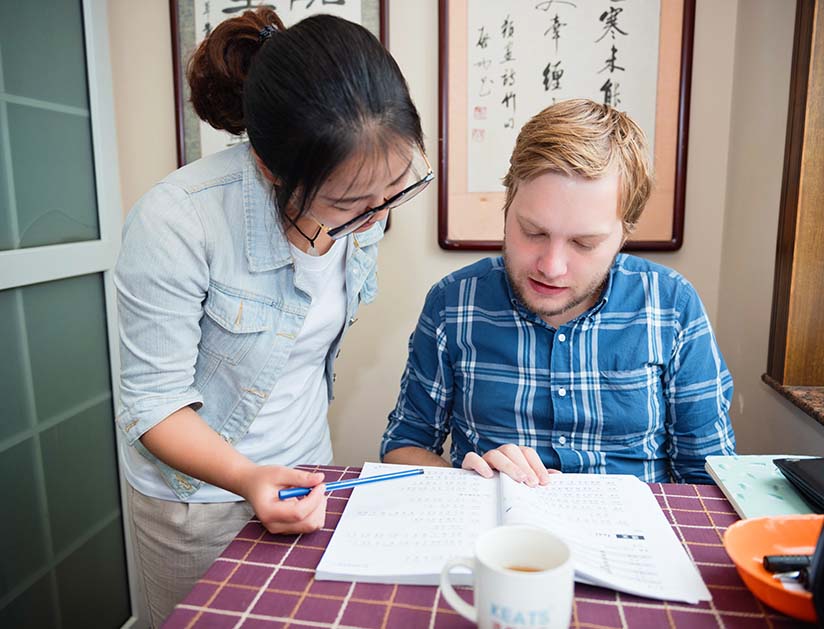Level 1 – Elementary [HSK 1, HSK 2, HSK 3]
HSK 1
In HSK 1, you will show
Verbal Communication skills:
Being able to practice basic listening, speaking, reading, and writing skills;
Being able to have a brief conversation on the most familiar topics and tasks or being able to reply to others for the simplest social purpose.
Topics and tasks:
Being able to converse on topics of personal information, daily life, dining, transportation and hobbies, etc; and being able to practise relevant social interactions.
For example: being able to use the most basic etiquette terms and phrases to interact with different people; being able to recognize and identify specific simple information in a public environment and make an inquiry about it.
Quantitative indicators:
Being proficient with 269 syllables, 300 Chinese characters, 500 Chinese words, and 48 grammar points.
Suggested Learning Hours:
60 Hours
Textbook:
HSK 1 Standard Course + Workbook + Complementary Materials
HSK 2
In this grade, you will show
Verbal Communication skills:
Being able to practice basic listening, speaking, reading, and writing skills;
Being able to have a brief conversation on relatively familiar topics and tasks or being able to reply to others for basic social purposes.
Topics and tasks:
Being able to converse on topics of simple social activities, family life, study arrangement, shopping, dining, and personal feelings, etc; and being able to practice relevant social interactions.
For example: being able to order food in a Chinese restaurant and discuss personal hobbies with friends in Chinese; being able to recognize and identify the information on an admission and registration format and fill it in.
Quantitative indicators:
Being proficient with 468 syllables (199 increased), 600 Chinese characters (300 increased), 1,272 Chinese words (772 increased), and 129 grammar points (81 increased).
Suggested Learning Hours:
80 Hours
Textbook:
HSK 2 Standard Course + Workbook + Complementary Materials
HSK 3
In this grade, you will show
Verbal Communication skills:
Being able to practice general listening, speaking, reading, and writing skills;
Being able to have a brief conversation on basic topics and tasks about daily life, study, and working events or being able to conduct daily social interactions.
Topics and tasks:
Being able to converse on topics of traveling experience, course schedule, cultural and sports events, festivals and customs, education and occupation, etc; and being able to practice relevant social interactions.
For example: being able to talk about itineraries and customs related to traditional festivals such as the Spring Festival; being able to send relatively formal invitations by both spoken language and writing letters; being able to reply to other’s invitations.
Quantitative indicators:
Being proficient with 608 syllables (140 increased), 900 Chinese characters (300 increased), 2,245 Chinese words (973 increased), and 210 grammar points (81 increased).
Suggested Learning Hours:
100 Hours
Textbook:
HSK 3 Standard Course + Workbook + Complementary Materials

Level 2 – Intermediate [HSK 4, HSK 5, HSK 6]
HSK 4
In this grade, you will show
Verbal Communication skills:
Being able to practice considerable listening, speaking, reading, and writing skills; Being able to do the initial interpretation.
Being able to have completed, constant, and efficient social interactions on complex topics about daily life, study, and working events.
Topics and tasks:
Being able to converse on topics of community life, state of healthiness and wellbeing, campus life, daily working, animals, and plants, etc; and being able to practice relevant social interactions.
For example: being able to briefly describe his/her conditions and communicate with doctors when in the hospital; being able to draft a simple advertisement for a part-time job and reply to others’ inquiries.
Quantitative indicators:
Being proficient with 724 syllables (116 increased), 1,200 Chinese characters (300 increased), 3,245 Chinese words (1,000 increased), and 286 grammar points (76 increased).
Suggested Learning Hours:
200 Hours
Textbook:
HSK 4 Standard Course + Workbook + Complementary Materials
HSK 5
In this grade, you will show
Verbal communication skills:
Being able to practice considerable listening, speaking, reading, and writing skills; Being able to do the basic interpretation.
Being able to have completed, smooth, and efficient social interactions on complex topics about daily life, study, and working events.
Topics and tasks:
Being able to converse with topics of social relationships, lifestyles, learning methods, natural environment, social phenomenon, etc; and being able to practice relevant social interactions.
For example: being able to discuss or communicate with others about the common social phenomenon; being able to reply to emails content, to introduce personal learning tricks and advice.
Quantitative indicators:
Being proficient with 822 syllables (98 increased), 1,500 Chinese characters (300 increased), 4,316 Chinese words (1,071 increased), and 357 grammar points (71 increased).
Suggested Learning Hours:
400 Hours
Textbook:
HSK 5 Standard Course + Workbook + Complementary Materials
HSK 6
In this grade, you will show
Verbal Communication skills:
Being able to practice considerable listening, speaking, reading, and writing skills; Being able to do general interpretations.
Being able to have abundant, fluent, and decent social interactions on professional topics about the study and working events.
Topics and tasks:
Being able to converse with topics of social life, business affairs, arguments and conflicts, social news, and comparison between China and other countries, etc; and being able to conduct relevant social missions.
For example: being able to talk about the differences between China and other countries in aspects of history and culture when being on an informal occasion; being able to understand the social news generally and comment on it.
Quantitative indicators:
Being proficient with 908 syllables (86 increased), 1,800 Chinese characters (300 increased), 5,456 Chinese words (1,140 increased), and 424 grammar points (67 increased).
Suggested Learning Hours:
600 Hours
Textbook:
HSK 6 Standard Course + Workbook + Complementary Materials

Level 3 – Advanced [HSK 7, HSK 8, HSK 9]
HSK 7
In this grade, you will show
Verbal Communication skills:
Being able to practice listening, speaking, reading, and writing; Being able to make initial professional interpretation work.
Being able to have formal, fluent, and decent social interactions on relatively comprehensive and higher-level topics.
Topics and tasks:
Be able to talk about topics within social etiquette, science, and technology, culture, and art, sports, emotions and feelings, professional curriculum, etc., and to be able to carry out relevant social interactions.
For example: being able to communicate with participants when attending a relatively formal meeting; being able to read and understand most learning materials for a professional subject, as well as complete assignments on the subject.
HSK 8
In this grade, you will show
Verbal Communication skills:
Being able to practice well listening, speaking, reading, and writing skills; Being able to do professional interpreting works.
Being able to apply various kinds of techniques and skills comprehensively; being able to have formal, fluent, and decent social interactions on various social topics in different scenes.
Topics and tasks:
Being able to converse on topics of language and literature, economy and politics, Legal affairs, philosophy and history, etc; and being able to conduct relevant social interactions.
For example: being able to deliver profound conversation and have a discussion on topics of philosophy, religions, and current events; being able to do basic professional interpreting works; being able to express his/her own, call into question and declaim reasons for complaint when there are conflicts.
HSK 9
In this grade, you will show
Verbal Communication skills:
Being able to practice well listening, speaking, reading, and writing skills; Being able to do professional interpreting works.
Being able to apply various kinds of techniques and skills comprehensively; being able to have formal, fluent, and decent social interactions on various social topics in different scenes.
Topics and tasks:
Being able to converse on topics of academic research, policy and regulations, business and trades, international affairs, etc; and being able to conduct relevant social interactions.
For example: being able to participate in business negotiation and debate with the counterpart under a formal circumstance; being able to read and understand documents with formal patterns and terms, such as policies and regulations, or a study report; in addition, being able to make decent comments on the topic.










